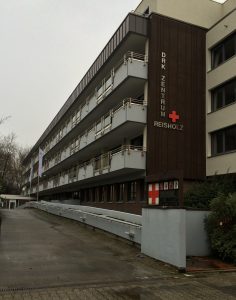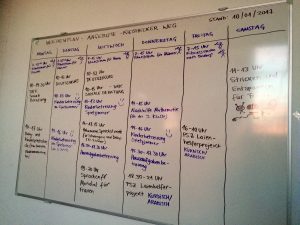Lots of errands + my first week!
Monthly bus ticket= bought!
Visa= got it!
German phone= set up!

My German phone!
As my vacation started to end, I had to start thinking about reality again and planning for my four-month stay. So when I started to tackle everything, I quickly realized just how different and confusing these things were in comparison to doing them back in America. It took me and one of my German friends two and a half hours and three phone calls one day to figure out what bus ticket I need and how to purchase it, I had to find a “picture-taking” place, as well as somewhere where I could print my visa application and I had to figure out how to set up my phone after my SIM card never came in the mail. Everything got done in the end but I couldn’t help but think how annoying all of these little things were for someone who A. chose to be here, B. can speak German and C. has lots of German friends who can and are willing to help me versus an asylum seeker or immigrant who might not fall under any of this criteria. These were just a few of the many things I learned this week that asylum seekers, specifically, struggle with within the first several months after they arrive in Germany.

German Red Cross-Duesseldorf main office
Each day of my first week was drastically different from the one before it but I quickly learned that there are lots of things that need to get done, never-ending obstacles and not as many workers as there need to be, but things still get done. This week I spent two days at one of the five refugee shelters that are here in Duesseldorf. This particular shelter was said to be the “best” one in the city because attached to the building is an Aldi, it is not in a residential area (so much fewer complaints are made from outside of the shelter) and they have lots of services and activities available to the residents within the same building. Some of the things I’ve done this week were reading and asking a lot about the asylum process in Germany, sitting in on individual consultations, assisting with data entry, attending the weekly team-meeting (consisting of my supervisor who leads the Integration and Migration department at the German Red Cross-Duesseldorf and workers at the shelters for asylum seekers) and learning more about what services and partnerships the German Red Cross-Duesseldorf has.
Although my German is not fantastic, everyone has been very welcoming, patient with and helpful to me, and for that I am beyond grateful! But even with my broken German, I’ve already been able to talk to some of the staff about the frustrations that they and this population faces. I came into this knowing that there would be challenges but learning that, like Social Work in America, there are many overarching rules and regulations that need to be considered when providing services to asylum seekers, refugees and immigrants. One of the newest (and perhaps most frustrating) rules that have been put into place in Germany is that whichever city an individual/family enters into Germany as an asylum seeker, they have to stay in that same city for at least three years. This is even the case when jobs and apartments cannot be obtained or when they have family members in other cities within Germany. Through the employees’ and clients’ frustration however, there is still an attitude of patience and positivity and I really admire everyone for that. There is still so much to learn, so I am really looking forward to what’s next. I am just hoping, however, that I won’t feel too overwhelmed within the next coming weeks!

Services and events calendar at the shelter I visited for this week (sorry for the poor quality!)
Thanks for reading and let me know if you have any questions about the shelter I visited, the consultations, what services the GRC provides or anything else you can think of and I will try my best to answer them or find the answers!
Your anecdote about the effort it took for just the bus ticket was an excellent example of how hard it is just to navigate the ordinary things when you are in a new country. Thanks for capturing your experience here in this blog!
Dean Smyth, you are most welcome! Thank you for taking the time to read and comment.
No questions, but just wanted to let you know that I enjoy reading about your experiences. I appreciate the time you take to keep your blog updated.
Mrs. Horne, I am glad you are getting something out of my experiences!
Cherice, What cities-of-entry have the most refugees (now in place for 3 years)? How are the refugee housing and other shortages being met? Are jobs available for those who learn some German? I appreciate learning about another nation’s social safety net. And a big Thank You for blogging!
Great questions Pat! I hope I am understanding your question correctly though- if not, please clarify it for me when you get a chance!
So I was told that the “3 year rule” was put in place this past summer. Again, it requires asylum seekers to remain in whichever city they enter for at least three years. Therefore, I couldn’t find information on the most common “arrival cities” for asylum seekers in Germany between then and now. I do know however, that asylum seekers enter in a variety of ways (by plane, car, etc.) and the cities in Germany that had the largest population of these individuals in 2015 are: Berlin, Bremen, Hamburg and Cologne.
As for housing and other basic needs, there is definitely an ongoing struggle with this. At the moment, in the city of Duesseldorf, there are 61 established and free of charge shelters for refugees and asylum seekers. This is a solution for those who have just arrived and who have no other option, but because there is not much space to house everyone and because finding an apartment in this city AND because people are now forced to live in this city for at least three years after their arrival, as opposed to looking for housing in a nearby city, this is a major problem. In the end, people end up living in the shelters for years. There are financial resources and organizations that provide clothes, strollers, kitchenware, etc. but the problem is still not resolved.
I do believe that jobs are available (at least in this city) but whether or not they can work, depends on when an individual has arrived and their residence status. One of the residents I met a few days ago has been here for a little over a year now and although his German is not fantastic, he works part time at a Turkish fast food restaurant. So with this, and other information I’ve gathered, I learned that the language requirement only stands for those who apply for more skilled professions, or it can be up to the individual employer.
With each of these points, there are so many more things I could mention and throw out there but I hope that somewhat answered your questions! Thanks for commenting!
This gives me a better picture of the way Germany is trying to address housing shortages, etc. The example of the person taking a job in a restaurant even though his German is not great is a good illustration of the adaptability of new residents and generally on how refugees face employment challenges. Thanks!
No problem! The housing situation is really tough at the moment but I am confident that the staff in possession of this city’s housing resources do a great job of making them available and accessible to those who need them. A lot of the residents in the GRC’s shelters are motivated in similar ways and that is always really exciting and inspiring to see.